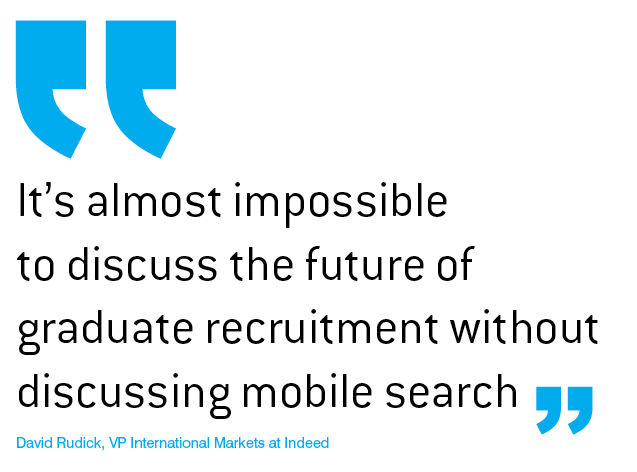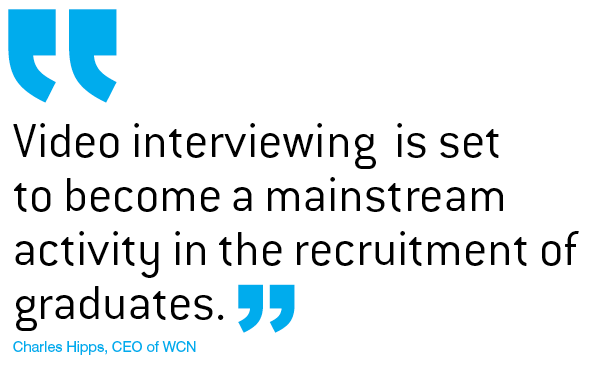Written by Lauren Mackelden, Features Editor, Onrec Magazine
At the Graduate Recruitment Bureau, Dan Hawes, Co-founder and Marketing Director , says graduate recruiters are starting to talk about the “war for talent” again, so they predict the market to be very strong in 2014. Dan Hawes also notes that “The AGR back this up with over 200 members expecting to offer 10.2% more graduate level vacancies in 2014.”
However, large job sites and job aggregators continue to attract thousands of job seekers and therein lies the problem says Hawes. “The market is saturated and applicants can be overwhelmed with the choice and find it hard to make the right choices.” Not surprisingly, Dan believes what students and graduates want are niche operators with a personal service to match and a track record of placing graduates just like them into long term careers.
Milkround, another graduate site, also reports a positive turn in the graduate recruitment market, as they say recruiters are looking to fill 8.7% more vacancies than last year, the biggest they have seen year on year for four years, and the highest number of positions available since the start of the recession. “Although we can expect an increase in vacancies, competition is still high, and we have seen in the responses to our own Career Confidence survey that 61 per cent of students and graduates feel confident that they will find some kind of employment after graduating, but only 35 per cent are sure that they will be able to secure a graduate specific role.” Milkround also notes a turn in the types of skills that employers are looking for, and currently digital skills such as HTML coding are topping the list as job roles become more multi-functional. They say an ‘entrepreneurial spirit’ has also started to crop up in many more job applications as employers look for self-starters to grow their businesses.
Engage graduates with mobile applications
It’s almost impossible to discuss the future of graduate recruitment without discussing mobile search, a trend that is driven primarily by the youngest group of jobseekers, comments David Rudick, VP International Markets at Indeed. “Mobile applications via Indeed have more than doubled over the past year, accounting for over a third of all visits to the website in 2013. This currently stands at 45% and is projected to rise to half of all visits by mid-2014 – that’s around 6 million job seekers per month searching from mobile devices alone.”
Rudick believes employers have no choice but to re-assess their recruitment strategies and technology in line with this trend, to give them the best chance of attracting young talent and keeping ahead of the competition. “For employers, effective engagement with graduates will depend on ‘lifting the lid’ on company culture, giving real insight into the business and what it’s like to work there. Heavily influenced by social media and peer reviews, the graduate workforce will demand this level of transparency before making a career decision. Jobseekers’ no longer skip straight to ‘salary’ but weigh up criteria such as management, work-life balance and culture. Indeed features over 4 million employer reviews – over 250,000 of these are employers with jobs in the UK. These reviews allow jobseekers to learn more about an employer before deciding to apply for or accept a role with a company, as well as giving the companies themselves and insight into what candidates are looking for when applying.”

Videos about companies are certainly becoming more widespread. “Giving out coffee mugs and T-shirts at job fairs gets your company in front of new grads, but it doesn't say anything about who you are as an organization or provide any intelligence on what it's like to work there” says Caleb Hanson, Rapt Media Product Director. “Grads want to work somewhere that resonates with them and where they feel they'll fit in and succeed. Companies are starting to realize that video is a great way to engage recruits and broadcast their company culture and values.” For example, Deloitte New Zealand created an interactive "day in the life" video, which projects the company's values while also pitching Deloitte as a great company to work for.
“2014 signals a boom in UK Graduate employment opportunities” claims Jason Staniforth – Digital Marketing Specialist for Vacancy Filler Recruitment Software.“It has previously been understood that you go to university, graduate, and then enter the working world to become exactly what you studied for – the harsh reality is that this has not been the case for a number of years, and many graduates are finding out the hard way. Many of the opportunities available will be offered to those who have previously worked for the company, meaning graduates who took advantage of paid internships, industrial placements or vacation work will have the upper hand in the grad-race for paid work in a related sector. Technology advances and the rapid uptake of social media vehicles hasn’t gone unnoticed by employers, with an increase in advertising spend being dedicated to social media such as Facebook, Twitter, LinkedIn and even YouTube to reach prospect graduate employees, this has resulted in less spend on traditional methods such as graduate directories and sector/ local guides. Technology such as video interviewing is making its impact on the recruitment industry this year, with many recruiters maximising on the technology for distance interviews, with graduates who are looking for careers in major cities, such as London. This trend is likely to continue with ‘normal’ recruitment looking to follow suit in order to reduce the time and cost of hire.”
Video interviewing is also highlighted by Charles Hipps, CEO of WCN. He says although it’s been around for some time, it is set to become a mainstream activity in the recruitment of graduates. “Video interview technology permits recruiters to reach an unrestricted talent pool, allowing graduates to be analysed before deciding on additional screenings and assessment centres. The video format can be embedded with messages and content from the employer that shapes the whole process in ways previously uncontrollable.” Hipps comments that video interviewing shows a level of consideration towards the graduate, acknowledging that they might have commitments outside of the recruiting process or large distances to travel, enhancing the candidate experience which is something every organisation should strive for. The whole process provides recruiters with a greater flexibility, because they can review candidates’ interviews as and when they want, replay recordings and ask for fellow decision maker’s opinions, thus giving the graduates the best opportunity to be heard.

Hipps also notes Google+ hangouts are also creating a real buzz in 2014. “After launching in 2013, companies are realising the huge potential on offer, allowing them to connect with carefully selected groups of graduates or simply an eclectic mix, dependant on the recruitment parameters. The key is to use the virtual events on Google hangout to attract the next generation of talent. Top companies are creating interaction by generating an ‘event’ with a company’s CEO to encourage participants to check out the company’s career website for openings, while the Google+ hangout facilitators send participants a direct link to the site using the chat box.”
Mike Hill, chief executive at Graduate Prospects agrees that economic indicators suggest recovery is gathering pace. Although Hill sees it is more concentrated in the South and South East, the good news is that it is spreading further afield to other urban areas such as Manchester – all of which are also hot spots for graduate recruitment. Hill predicts that while it may be many years before we return to pre-recession levels of graduate employment, we would expect to see brighter prospects for the new cohort of graduates as well as those who took a year out. “Sectors that are continuing to do better this year are construction, IT and telecoms, so we should expect to see slightly improved job prospects for graduates going into these areas.”
‘Content is king’ may be a cliché, says Mike Hill, but it’s a strong one and the premise will continue to be relevant for the year ahead as recruiters look to engage more effectively with candidates. “Creating engaging content brings commercial returns and so we continue to invest in both our content and user experience. We’ve become much more than a jobs board with in-depth information and advice spanning careers, life at university, gap years, postgraduate education, and career planning tools. As a result our latest ABC audit confirmed that we have the most widely used graduate careers website with 2,008,552 unique users every month, marking a 36% year-on-year increase and more than double that of any other graduate careers website.”
So, the class of 2014 have much more to look forward to than in previous years. The challenge for recruiters in the future will be how to attract and engage the best talent. Mike Hill believes the idea of marketing to final year students to bag the brightest and best is outdated. He suggests the process will have to start much, much earlier: “Graduate recruiters have had to rethink and are developing strategies to successfully engage with talent earlier, which means engaging school leavers onwards. This comes with its own unique set of challenges as well as opportunities. As well as enabling recruiters to have a better and more efficient chance of securing the best talent, it means a whole host of new initiatives need to be put in place from identification schemes to ongoing communication programmes. At the moment many recruiters are working out the best approach, but the landscape will only become more competitive.”
Recruiting Graduates: What to consider
Steve Simmons, Client Services Manager, First Advantage
Each summer, a new wave of university graduates enters the job market and 2014 has been the busiest since the recession. According to a new report released, graduate recruitment in 2014 is 12% up on 2013, with the highest number of new graduate jobs coming from the top accounting and professional services companies. At First Advantage, we see a significant influx of graduate screening in the second quarter of the year and 2014 has been our highest on record.
Recruiting graduates differs significantly from other types of candidates. Here are three key considerations when preparing to screen graduates:
Tailored graduate screening. Think carefully about which checks you need to perform on your graduates and create a separate graduate screening package accordingly. If a graduate was screened when they previously worked for your organisation, e.g. on an internship, do they need the same level of screening a new graduate or just a basic criminal check?
The most frequently requested graduate checks include identity verification, employment history, education/academic qualifications, consumer credit and criminal record checks.
Employment history. Many graduates will have brief periods of casual work, such as retail, hospitality and office placements in their recent past. Carefully considering what period of employment and the overall ‘activity period’ need to be verified will help you save time in the long run. (Do you really want the hiring decision resting on Carl’s Burger Van providing a reference?)
Project management. It’s possible you’ll have hundreds even thousands of graduates entering screening in one day. Consider moving these outside of your ‘business as usual’ screenings and agree completion timescales with your provider, so they can be managed separately and screening performance measured discretely.
In our experience, students who have taken a gap year are seldom seen as being less attractive than those coming straight from university. Students who have taken time out just need to be prepared to explain what they did when and provide supporting documents on request.
In terms of social media, we recommend clients not to use sites such as Facebook to filter applicants and evidence suggests that most employers agree. However, many employers will use LinkedIn to assess a candidate’s character. This platform can be useful to both employers and candidates as a way of both ‘swotting up’ on another.



